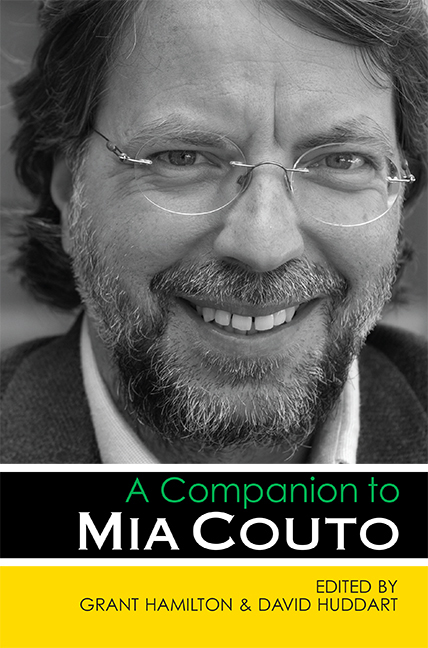Book contents
- Frontmatter
- Dedication
- Contents
- Acknowledgements
- Notes on Contributors
- Introduction
- An Interview with Mia Couto
- 1 Mia Couto in Context
- 2 Uma coisa fraterna Mia Couto & the Mutumbela Gogo Theater Group
- 3 Reading Raiz de orvalho Counterpointing Literary Genres in the Work of Mia Couto
- 4 Spaces of Magic Mia Couto’s Relational Practices
- 5 Mia Couto or the Art of Storytelling
- 6 The Multiple Worlds of Mia Couto
- 7 ‘Ask Life’ Animism & the Metaphysical Detective
- 8 Mia Couto & Translation
- 9 Jesusalém Empty Fathers & Women’s Texts
- 10 Trauma Repetition & Pure Repetition in The Tuner of Silences
- 11 Seeing Like a Crocodile Bird Mia Couto’s The Last Flight of the Flamingo
- 12 Mia Couto & Nostalgia Reading The Last Flight of the Flamingo
- 13 Mia Couto, Contexts & Issues A Bibliographic Essay
- Bibliography
- Index
7 - ‘Ask Life’ Animism & the Metaphysical Detective
Published online by Cambridge University Press: 22 May 2021
- Frontmatter
- Dedication
- Contents
- Acknowledgements
- Notes on Contributors
- Introduction
- An Interview with Mia Couto
- 1 Mia Couto in Context
- 2 Uma coisa fraterna Mia Couto & the Mutumbela Gogo Theater Group
- 3 Reading Raiz de orvalho Counterpointing Literary Genres in the Work of Mia Couto
- 4 Spaces of Magic Mia Couto’s Relational Practices
- 5 Mia Couto or the Art of Storytelling
- 6 The Multiple Worlds of Mia Couto
- 7 ‘Ask Life’ Animism & the Metaphysical Detective
- 8 Mia Couto & Translation
- 9 Jesusalém Empty Fathers & Women’s Texts
- 10 Trauma Repetition & Pure Repetition in The Tuner of Silences
- 11 Seeing Like a Crocodile Bird Mia Couto’s The Last Flight of the Flamingo
- 12 Mia Couto & Nostalgia Reading The Last Flight of the Flamingo
- 13 Mia Couto, Contexts & Issues A Bibliographic Essay
- Bibliography
- Index
Summary
Despite being commonly associated with magical realism, Mia Couto's work is not shaped by Anglophone global expectations of literariness that influence even works that will be read in translation. Couto's fiction is part of a sizeable and powerful international literary system, that of the Lusophone world. But that system does not straightforwardly fit into the world of globalist consensus, or the circuit of international festivals and prizes. Accordingly, while Couto is finding acclaim in those same circuits of the world republic of letters, his work remains situated in a specific world that is shaped by traumas, hopes, and the realities of Mozambican postcolonialism. To understand Couto in terms of World literature is not to identify him as a ‘global novelist’; it is instead to immerse readers in a world that is part of the wider network but that demands to be taken on its own terms. This chapter discusses Couto's fiction in terms of its resistance to a globalist demand for ‘transparency’ through examples that demonstrate his exploration of the postcolonial metaphysical detective story, in particular Under the Frangipani (2001). Through this discussion, the chapter situates Couto's work in the context of Édouard Glissant's ‘theory of opaque structures’ (Glissant 1999). Glissant's influential idea explores how literary works can function to create an opaqueness resistant to unquestioned and coercive models of communication.
One of the recurring ways Couto's fiction explores such opaqueness is in its use of animism, with the voicing of both the non-human and the dead. In The Tuner of Silences we read the following: ‘The dead don't die when they stop living, but when we consign them to oblivion’ (Couto 2012a, 52). This conception of the dead expresses ideas of time and place that are far less rigid or fixed than the consecutive, linear, or the ‘grid-mapped’. The dead remain with us, not quite or not exactly beyond a frontier that divides them forever from the living; indeed, the dead live on, influencing the everyday life of the living. As this chapter suggests, in Couto's work this general understanding of the dead is given a specifically Mozambican context, in which a new post-civil war world seems likely to consign both the pre-war reality and the Mozambican environment to oblivion.
- Type
- Chapter
- Information
- A Companion to Mia Couto , pp. 125 - 139Publisher: Boydell & BrewerPrint publication year: 2016

